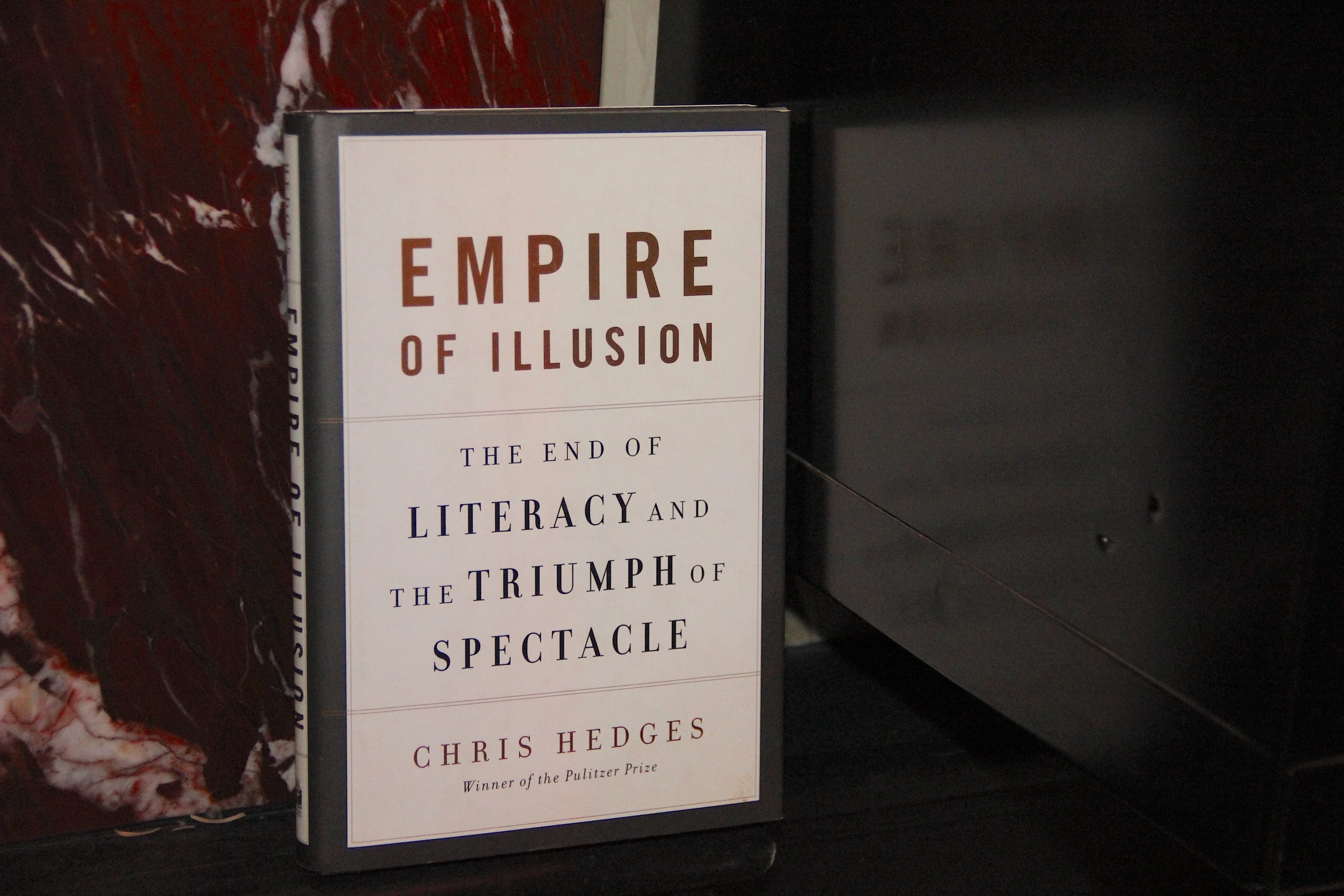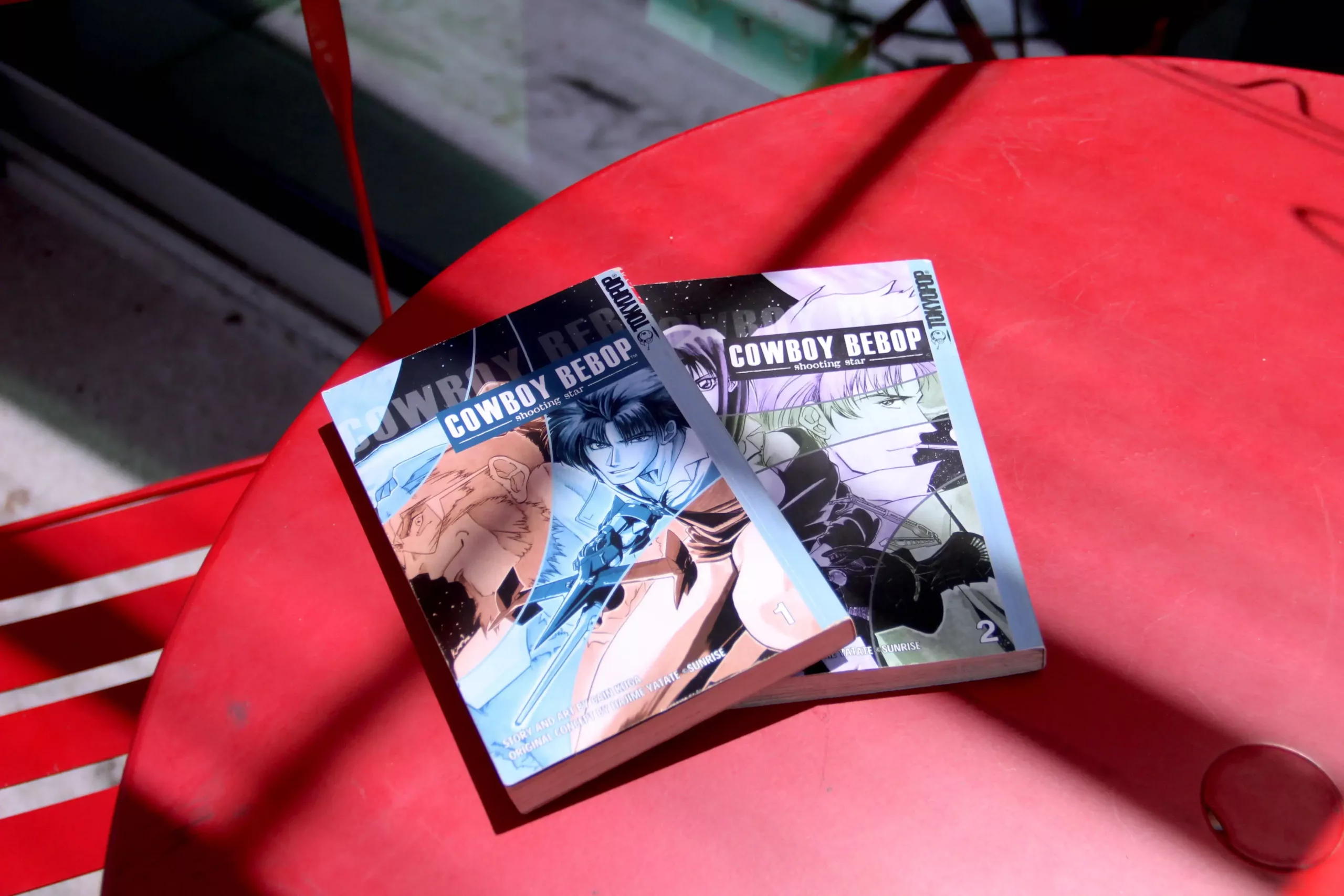

As an Amazon Associate, we earn from qualifying purchases.
Chuck Palahniuk’s “Damned” is a part horror, part fantasy novel taking the reader through the geography of Hell by combining the structure of Judy Blume’s “Are You There God? It’s Me, Margaret” with the character archetypes of the “The Breakfast Club.”
Though Palahniuk’s status as a prolific, critically acclaimed author shows on the line-level, the novel itself is a messy, often repetitive endeavor that doesn’t stand out as something necessarily worth reading. The few poignant moments illuminating grief, death and Western hypocrisy are drowned among repetitive crass, brutal and offensive descriptions that seem to have no intent other than to shock the reader.
If you’re looking for an intro into Palahniuk, you would do better starting with his earlier works such as “Fight Club” or “Choke.” If you’re looking to expand your knowledge of Palahniuk, then reading “Damned” might be worth your while.
‘Damned’ Summary: Tween Telemarketers in Hell
Thirteen-year-old Madison Spencer wakes up in Hell. She thinks she died from a marijuana overdose, and that that is the reason she finds herself in Hell rather than in Heaven. She is the daughter of Hollywood megastars whom she describes as “former beatniks, former hippies, former Rastas, former anarchists,” a fat girl who has been ostracized throughout her (short) life. Her first stop in Hell is a jail cell where she befriends her surrounding mates:
- Babette, a self-involved popular girl
- Leonard, a nerd possessing seemingly endless knowledge
- Patterson, a classic jock
- Archer, an alluring punk
Together, they escape their confinements and begin exploring the terrains of Hell.
After her death, it seems, Madison starts living. After travelling through Hell’s terrains — such as The Sea of Insects or perhaps The Ocean of Wasted Sperm, all representing different sins and modes of torture — Madison ends up working as a telemarketer at one horrific call center and beginning to recruit a surprising number of souls to Hell through her calls instead of tormenting them. Eventually, Madison learns her real cause of death and the truth about her presence in Hell.
At The Rauch Review, we care deeply about being transparent and earning your trust. These articles explain why and how we created our unique methodology for reviewing books and other storytelling mediums.
Audience and Genre: Speculative Fiction for Gore Lovers and Those Intrigued by The Afterlife
Readers from all demographics looking for a novel about the afterlife that does not shy away from gore elements will likely find a match in “Damned.” The novel might appeal to those who wish for a book that deals with death and grief without hiding the ugly parts, but still maintains an optimistic philosophical approach overall.
Though set in Hell, the novel creates an afterlife that embodies the contemporary world which it parallels. Still, fantastical elements do exist within “Damned”; the presence of different demons, Satan himself, and the ability to travel between different realms all add a supernatural backdrop to the novel’s realistic aesthetic. Readers looking for something set in-between the every-day and the otherworldly might be interested in giving “Damned” a chance.
Perspective: A First-Person Account of Hell, Written in Letters to Satan
The novel is composed of confessional letters from Madison to Satan, starting at the point when she wakes up in Hell, interspersed with memories of her short life, in the style of “Are You There God? It’s Me, Margaret.” In the letters, Madison references many of the influences of the novel directly, including Judy Blume, “The Breakfast Club,” which she keeps comparing her little band of misfits to, and novels such as “Jane Eyre,” which developed Madison’s sense of self as a person.
The first-person narration puts readers directly in Madison’s head, and that narrative choice might lead to the most glaring of the novel’s weaknesses. Madison does not sound like a thirteen year old girl. To be fair, she is highly self-aware. A common theme of the novel are lines such as “I might be thirteen and a newbie to the underworld, but don’t take me for an idiot” and “I might be a dreamy, romantic, preadolescent girl, but I can recognize a metaphor when one batters me over the head.” Nonetheless, the awareness feels more like a copout enabling Palahniuk to use a voice he is familiar with (that of an older white man) rather than a genuine attempt to create a 13-year-old girl with a voice unique to her experience.
Three Cs: Compelling, Clear, Concise
Editorial Note: We believe these three factors are important for evaluating general writing quality across every aspect of the book. Before you get into further analysis, here’s a quick breakdown to clarify how we’re using these words:
- Compelling: Does the author consistently write in a way that would make most readers emotionally invested in the book’s content?
- Clear: Are most sentences and parts of the book easy enough to read and understand?
- Concise: Are there sections or many sentences that could be cut? Does the book have pacing problems?
Compelling: An Attractive Idea With Tiresome Execution
While the idea of a 13-year-old girl waking up in hell and collecting a band of misfits around her on her way to find out how she truly died and why she truly ended up in Hell instead of Heaven is compelling in itself, the execution of this idea becomes tiresome after the initial excitement of the early chapters.
It’s hard to get invested in Madison’s quest when she does not read like a believable 13-year-old. Her memories of her family, friends and life begin to repeat themselves. Her time in Hell is a choppy collection of moments that don’t necessarily relate to each other. Other characters serve as props to Madison’s character, being reflected through the lens of her confessional letters only. It’s hard to relate to any of them outside of Madison’s story.
Overall “Damned” might sound more compelling to read than the actual experience of reading it.
Clear: The Prose Flows, The Story Does Not
The novel’s advantage is its prose. Palahniuk’s skills as a novelist show in the flow of the language and the clear structure of sentences. Palahniuk’s a clever writer who clearly knows the craft inside out. You could find plenty of gems worth quoting within “Damned,” such as this simple hopeful observation about the possibility of human betterment: “I can become someone else, not out of pressure and desperation, but merely because a new life sounds fun or interesting or joyful.”
But while “Damned” is brilliantly written on a sentence level, the novel’s story and progression might make you scratch your head and wonder if you skipped a beat. There is a clear arc throughout the novel, as Madison tries to figure out the true cause of her death and the reasoning behind her presence in hell, but what surrounds that through line is a series of choppy adventures that don’t necessarily relate to one another.
Concise: Repetitive Style Only Goes So Far
The novel repeats itself in two ways. The first is by repeating sentence structures such as “Are you there, Satan? It’s me, Madison,” which appears at the opening of every chapter. There are also repeated observations about life, Hell and Heaven, such as “what makes life feel like Hell is our expectation that it should last forever,” variations of which can be found peppered everywhere.
The second type of repetition feels much less intentional and much less effective. Many of Maddy’s memories of her parents and life are similar to one another plot-wise or serve to reveal the same thesis: their neglect, unabashed privilege and self-centrism lead to ruin. Unlike the novel’s linguistic repetitiveness, this recurring idea does not create a sense of style nor benefits the novel’s development. The point Palahniuk makes begins to fade in its intensity the more he makes it. Cutting some of these memories would have helped elevate the importance of each of the remaining ones.
Character Development: Can Death Actually Free You?
An interesting aspect of the novel is people’s ability to develop and change after death.
Maddy lived a short life of 13 years on Earth, but she gets to live an eternity in Hell. That eternity sees her gaining confidence in herself, learning about the world she used to live in as well as the world she lives in now, discovering her true circumstances both on Earth and in Hell, making friends, affecting souls on Earth and encouraging them to come join her in Hell, and even changing Hell’s landscape.
Aside from Maddy, however, other characters do not get much development. Though insights into their past on Earth change Maddy’s perception — and therefore the reader’s perception — of their Breakfast Club stereotypes, the characters remain serving the sole function of these stereotypes: Babbette encourages Maddy to advocate for herself, Leonard expands Maddy’s view of the world, Patterson enables Maddy to have fun, and Archer helps her gain the courage to escape a literal prison, as well as a figurative one of thought.
“Damned” does not allow its full cast of characters to have transformative arcs. But, at least regarding Maddy, it is definitely not a static novel. Within its universe, it begs the question: Can death actually free you?
Story: An Inconsistent Narrative
Maddy’s first journey with her friends is a jailbreak and an exploration of Hell’s terrain. Moving on from there, suddenly Maddy works in Hell’s telemarketing department, where she ends up convincing lonely souls to make their way to Hell.
Then, out of nowhere (spoiler alert), Maddy goes to become Hell’s new dictator after brutalizing the likes of Hitler (collecting his mustache as a souvenir) and gathering their followers under her new ruling wing. Maddy’s final adventure is a return to earth on All Hallows Eve and a face-to-face meeting with Satan where he (massive spoiler alert!) reveals to her that she’s just a character in his book.
The non-existent relation between Maddy’s adventures creates the sense that, as a reader, you’re constantly missing some piece of information. Instead of getting excited to continue reading the book, you might just be confused.
Nevertheless, “Damned” does keep up with its promise to reveal Maddy’s true cause of death and the reasoning behind her presence in Hell, and that part remains consistent and satisfying.
Prose Style: Shocking for Shock Value
Palahniuk is known for being upfront and crude in his writing, and oftentimes that works well for the stories he tells. “Damned” is no different in that regard, except many of the shocking moments in “Damned” seem to not carry any meaning in them. They are there for the sole value of shocking the reader with the use of slurs, excessive gore and sexual descriptions, and off-hand snarky comments about Western society at large that offer little insight into people’s lives. These might leave a bitter taste in your mouth while reading.
Setting: Hell is a Vast Landscape
Inspired by the specificity of Hell in Dante’s “Inferno,” the setting in “Damned” takes us through a fully developed geography of Hell, all the while exploring different conceptions of demons’ punishment from different cultures and religions.
Modern Christianity provides the framework for Maddy’s journey through Hell. The novel even asserts that “as it turns out, the way-fundamentalist Christian creationists were Correct.” The Christian framework dictates the laws of Hell and its objectives.
Nonetheless, “Damned” does include in its setting creatures such as Pazuzu, “an Assyrian with a bat’s head and scorpion’s tail,” and Lamashtu, “a Sumerian she-devil who suckles a pig with one breast and a dog with the other.” The latter allows Leonard to explain to Maddy, and thus the reader, their significance in other religions and other religions’ perceptions of Hell. This diversity of creatures enables a culturally inclusive setting for the book that attempts to encompass varied ideas of the afterlife, yet further asserts modern Christianity as the dominant interpretation.
On the one hand, that limitation feeds into the book’s criticism of Western culture. On the other hand, the book inadvertently implies that other interpretations of the afterlife all end up tying back into Christianity, and are therefore lesser than.
Rhetoric: The Hypocrisy of the Western Lifestyle
Throughout “Damned”, Palahniuk peppers cutting observations of the Western lifestyle, both in Maddy’s memories of her life and in the current aftermath of her death.
Maddy’s parents function as mouthpieces for American hyper-capitalist liberalism, practicing feel-good and performative forms of activism such as adopting children from countries in the Global South for the benefit of their image, all the while owning houses all over the world, treating their employees with disdain, promoting Hollywood’s obsession with glamor, neglecting their daughter and asserting that they will go to Heaven upon their death.
Meanwhile Maddy’s job in Hell functions as a reminder of America’s exploited people. She attempts to change Hell into a better place by leading the followers of past dictators into transformative action (creating a more pleasant geography, uniting lonely souls). Maddy’s actions form an antithesis to the individualistic, vain lessons she was taught in her short life by her parents, peers and American culture as a whole.
Cultural and Political Significance: Against the Logic of Individualism
“Damned” did not pave any literary paths nor depict any cultural or political criticism that has never before been so explicitly shared. The book does, however, capture a sense of hyper-individualism and isolation in American culture; it critiques and locates itself within anti-capitalistic tradition with flair. Readers who hold their own criticisms of Hollywood’s rich liberal hypocrisy, bureaucratic systems that uphold oppression, and consumerism will find kindred views in “Damned,” ones that are expressed with clarity and brutal honesty.
The book’s critique of consumerism specifically feels even more relevant than it was in 2011, in light of the growing effects of our spendings on the Global South and climate change. Maddy describes her parents’ obsession with watching and maintaining their empty houses around the world as “consumption in absentia,” highlighting the growing disconnect between the physicality of products and the abstract idea of their consumption in late capitalistic society for those who don’t feel the material effects of this consumption.
Critiquing the Critics: A Consensus Across Critics and Consumers
Critics seem to agree on the weaknesses of the novel: repetitiveness, uninspired grotesqueness, a lack of plot and driving force. There seems to be a consensus both in magazines and in user reviews on websites such as Goodreads that this is one of Palahniuk’s weaker novels. Though some praise it for its unabashed criticism of Western liberal politics and lifestyle, and some enjoy its descriptions of hell and its demons and Madison’s adventures, the novel does not seem to garner many glowing reviews.
One criticism that seems to go unmentioned by professional reviewers is Maddy’s voice, which most describe as a typical teenage girl, citing her search for attention. In this review, I mentioned the pitfalls of Madison’s unrelatability as a character, which stem mainly from her not sounding like a believable 13-years-old girl. Perhaps there is more to teenage girls than seeking attention, and writing them can be a more complex endeavor than believed by some critics.
Book Aesthetic: Misleading in the Beginning, A Perfect Fit by the End
On the cover of “Damned”, you will find a stylish, handsome devil framed by flames. With his twirling thin mustache and a meticulously trimmed beard, he glares with disinterest at the reader and challenges them to pick up the book. The color palette is composed of shades of red, yellow, orange and black: what you’d expect from a book taking place in hell, except the devil’s eyes pop out in a bright shade of green, catching one’s attention.
Cracking open this novel after only looking at the cover might surprise you, as this aesthetic seems detached from the voice of a 13-years-old girl. Returning to the cover after finishing the novel might have the opposite effect, as it seems to perfectly fit the mood of the novel, where Hell is much more of a disinterested bureaucratic machine able to be deconstructed rather than a terrifying unknown.
Reviewer’s Personal Opinion: Excited at the Beginning, Let Down by the End
I was excited by the novel at first, but around a third of the way through this excitement waned. I had felt that the book had made its impression on me with its first third and had stopped providing new insights or developments to keep its momentum going, thereby leaving me disappointed to read what felt like paragraphs upon paragraphs I had already read and could almost skip. Emotionally resonant moments such as the reveal of Maddy’s true cause of death and her redevelopment of Hell into a better place did not elevate the novel as a whole but did elevate my sense of boredom at least. If “Damned” had built on its first third instead of repeating it, I might have enjoyed the novel more. As it stands, I feel let down by the experience of reading it.
‘Damned’: A Novel that Ultimately Does Not Keep Up Its Hype
To summarize, “Damned” is a novel that starts off full of potential, but slowly loses its momentum, circles around its point, and gets too tangled up in its rhetoric to provide an interesting story. Though some lines and moments stand out as unique and appealing, overall, “Damned” ends up being a weak work coming from a strong writer.
Buying and Rental Options
E-Commerce Text and Audio Purchases
Audio Book Options
Get recommendations on hidden gems from emerging authors, as well as lesser-known titles from literary legends.






